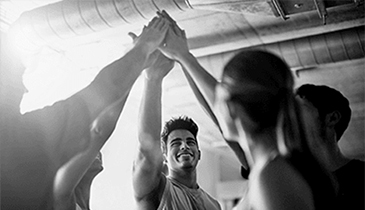 Consider the last time you were faced with a significant change in your life: What did it feel like to be presented with that opportunity or challenge? How did you handle it in the first few days, weeks, even months?
Consider the last time you were faced with a significant change in your life: What did it feel like to be presented with that opportunity or challenge? How did you handle it in the first few days, weeks, even months?
If it was a positive change, you probably felt some strange blend of excitement and trepidation. A burst of energy along with a bit of reluctance. If it was unexpected or negative, there was likely sadness, anger, or some degree of fear.
Good or bad, change is a foray into the unknown. It’s a new way of being and participating — and an essential part of our story as humans. But that doesn’t mean we don’t resist or question it, even in the instances when it promises possibilities for growth and advancement. There’s an innate part of us that wants things to stay the same or to go back to the old way. The familiar is proven and safe.
This is true for individuals as well as communities and society at large. Good examples of this are the invention and adoption of new technologies.
Take the commercial combine harvester. Invented in the 1800s, it merged three essential processes into one, creating a more efficient, streamlined harvest method. This was an exciting development for a time-consuming, time-sensitive chore. By the 1930s, widespread use of this equipment meant that field workers were no longer needed.
For those who relied on that work to get by, it was a painful reality that forced them to seek out different opportunities. Yet that innovation, despite the unemployment it initially caused, is now one of the main reasons we’re able to efficiently feed 7.4 billion people on this planet.
The invention of computers created a similar conundrum: Many manual computing jobs became irrelevant when the machines we created could do them faster, and often more accurately. Most of us now carry miniature versions of these devices in our pockets, giving us the world at our fingertips. For many people, this was hard to imagine just a decade ago.
The next wave of change that is coming (and is already here, in some cases) is the implementation of artificial intelligence, or AI. With its capacity to reason, AI will displace people from a wide range of jobs in the not-so-distant future. This will be especially difficult in the early stages.
Like the combine, computer, and countless other innovations, AI will bring a lot of good with it. And sooner than we know, it will lead us toward the next life-altering invention that we’ll adapt to and embrace as the new norm.
It’s what we’ve done time and again through the centuries — and will continue to do in the future. Change is not going to stop, no matter how much we dig our heels in initially: It’s inevitable and perpetual.
Sometimes it’s out of our control and happens to us, as is the case with disease, extreme weather events, and loss. Other times, we make it happen through our choices and ideas and our drive to move beyond the status quo. Regardless, we get to choose how we respond to it and manage our perspective.
It may take some time and we may need to give ourselves the space to take it all in and weigh the options. But when we decide to recognize and accept change — big or small, good or bad, individual or societal — we give ourselves permission to dwell less on what was and instead focus on what is, and what could be.
So the next time you’re confronted with change, notice your initial reaction. Notice any resistance or reluctance. Then, when you’re ready, see if you can reframe it around the possibility. It’s there.




